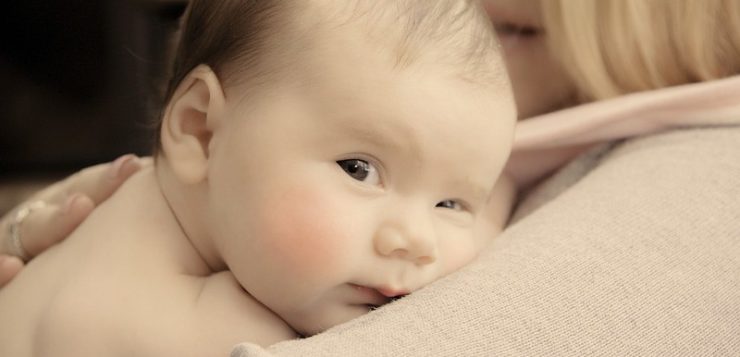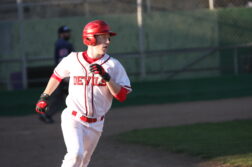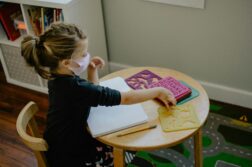
At the tail end of July 2018, in the middle of the night, I was sitting in the garden of my parents’ house in Oxford, UK. It was none too warm, but the old bricks of the garden wall had soaked the day’s heat in; my wife and I had tartan blankets over our knees, and the grass, under the porch-light, was a comical, lurid green. We were sipping champagne. Everyone else along the street had long since turned in.
And then, at 2:16 AM, came the ping of a WhatsApp message from my brother-in-law. We opened the video he’d sent, and here was the rising cry on the air we had been waiting for: my niece, a violent pink, eyes half sealed like a baby mouse’s, fists waving, appropriately furious at her entry into the world.
We ran indoors, woke up my parents. We sat on their bed and everybody cried. This was my parents’ first grandchild, since neither I nor my sister had given much thought to kids before now, and an unanticipated joy, since we were both fortyish. The baby was here. The baby was fine! It seemed incredible, there under the hallucinogenic moon, but there she was, squalling and protesting beautifully: living proof of herself.
What changed that night? I’ve had four years—and one book, which I was already in the process of writing—to think it over. Since coming out at eighteen, I’ve lived the expanded definition of family that many queer people do. Early experiences of being ourselves can be bruising, and I was one of the Section 28 generation, growing up in London in the late ’80s, where every other advert on TV was a public health announcement about HIV/AIDS. So I did what many of us do: rolled around, gathered moss, got married, and built a gorgeous, rambunctious, irreverent logical family to complement my always supportive biological family. I had a beloved wife, a best friend I’d known for longer than I hadn’t, and a group of friends we talked to every day and went on long, comfortable holidays with. These people had put the coffee on and given me a place to stay when relationships failed. They’d held me in the middle of anxiety attacks. I was a good student of post-structuralism, of cultural relativism: family, I thought, was a built environment.
That’s why I somehow did not expect this fluttering, holding my niece for the first time a week later, spotting that she had the same eye color as me. It was unexpected, and counter-intuitive, to be moved by the way she looked like a much-loved uncle who’d died a few years back; alarming, the way I could cry where I stood in the supermarket, organic broccoli in hand, if a rogue image of someone hurting her intruded on my tired brain. I was suspicious of this new flesh-and-blood rhetoric that had snuck into me, unannounced. It seemed to me vaguely eugenic in nature, and to go against the life I had constructed for myself. There is a term for it—“genetic bewilderment”—but it’s usually applied to parents of children conceived via donor gamete. For me, it was the other way around.
But, when I reflected on matters, I realized it shouldn’t have been such a big surprise that I felt this way. When I met my wife, we went through the shared grief period that I suspect many gay couples do: that we couldn’t have biological children that looked like each other. While I had no wish to visit my temperament or physiognomy on an unsuspecting infant, I felt sad that I couldn’t replicate Trish’s uncanny gorgeousness. Even as we understood these urges to be fundamentally bogus—because when do children reliably turn out like their parents anyway?—we felt sad nonetheless. And so, the arrival of my niece, as beautiful an event as it was possible to witness, provoked questions. Undeniably the gift of aunthood, made us revisit our choices about having children of our own—whatever that might come to mean.
A wise person once said that a novel is a machine for thinking with, and as I am a novelist, it seemed reasonable to work these concerns out in fiction, however unconsciously. In All of You Every Single One, the central couple’s child lands with them by unexpected, unconventional means that have nothing to do with biology. They, like me, have a ragtag, Bohemian, found family, who become the baby’s found family, too. I don’t think the novel ever lands on an answer as to which is more important, biology or the accretion of gradual acts of kinship and love. This is not a question that can be answered in any case. And for me, the urgency of answering it has retreated, too. It has been plenty to be able to celebrate the book and the thinking contained within it with all my family of all kinds around me, and to think often and delightedly of the fizz of the champagne cork and that strangled yawp at 2:15 AM in a garden in July.
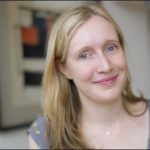 Beatrice Hitchman is an author and academic. Her research focuses on contemporary queer fiction, the ethics of historical fiction, writing the remote past, and the endings/closure events of novels. Her second novel, All of You Every Single One, was published last year.
Beatrice Hitchman is an author and academic. Her research focuses on contemporary queer fiction, the ethics of historical fiction, writing the remote past, and the endings/closure events of novels. Her second novel, All of You Every Single One, was published last year.
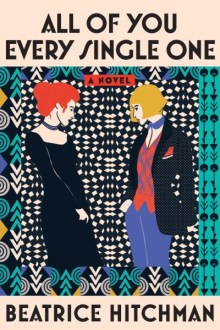
Set in Vienna from 1910 to 1946, All of You Every Single One is an atmospheric, original, and deeply moving novel about family, freedom, and how true love might survive impossible odds.


